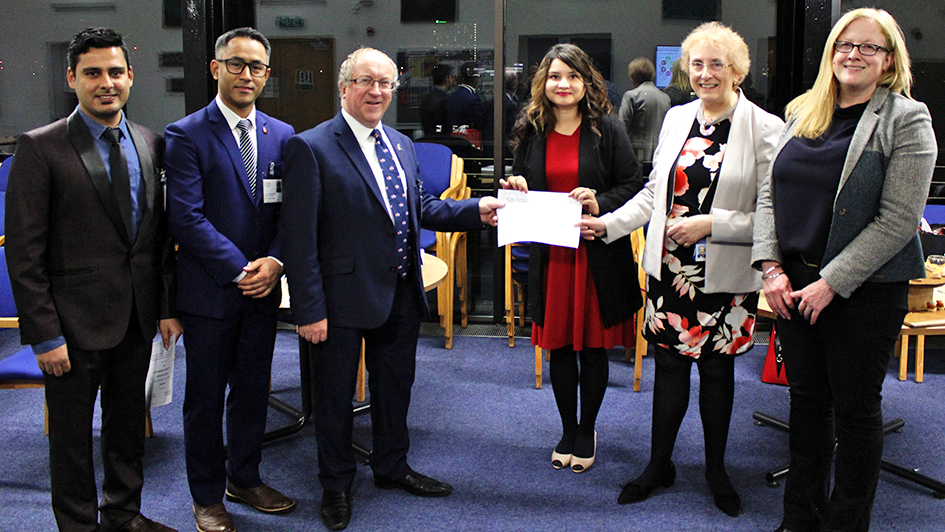
Image: ICR / Nepali Fellowship Reception. Left to right: Dr Bishal Paudel, Navin Bajracharya, Andy Sparkes, Dr Onika Karki, Professor Ros Eeles, Dr Charimaine Griffiths (former-ICR Chief Operating Officer)
Tuesday 4 February is World Cancer Day, which each year brings together millions of people across the world to show their support and to raise vital funds for life-saving cancer research.
The ICR is one of the most influential cancer research institutions in the world, and our world-class researchers are some of the most successful and prolific scientists working in cancer research.
Here in the UK, we are extremely lucky to have access to cutting-edge facilities and technology, and to be able to attract the best minds across the world to join us in our fight to defeat cancer. But science is a team sport, and our researchers are equally invested in sharing their knowledge to improve research and cancer care worldwide.
Professor Ros Eeles is an internationally leading figure in the field of prostate cancer research, and she has led definitive studies in genetic epidemiology, discovering genetic risk factors for prostate cancer and developing new genetic tests that could help detect which men are most at risk of developing high-risk disease.
Ros is also Consultant in Clinical Oncology and Oncogenetics at The Royal Marsden NHS Foundation Trust.
For several years she has been leading an exchange programme with doctors in Nepal that brings together Nepalese and British doctors and researchers to exchange expertise in the care and treatment of cancer.
The landlocked country of Nepal has a population of 30 million people, with approximately 60,000 cases of cancer diagnosed each year, but as a developing country its oncology services are limited.
We have a proven track-record of awe-inspiring research, which is transforming the lives of cancer patients around the world. This work is made possible by an extraordinary community of generous donors, which includes individuals, trusts and foundations and charity partners.
Support our work
UK/Nepalese oncology fellowships
Since 2017, oncologists from Nepal have been invited to visit the ICR and The Royal Marsden to take part in three-month oncology fellowships, organised through the Britain Nepal Medical Trust (BNMT).
Since it first started its work in 1967, the BNMT has significantly contributed towards strengthening health services in Nepal. Working closely with the Government of Nepal, international and local NGOs, and local communities, the BNMT supports communities to improve their health status, improve access to health services and alleviate poverty.
And BNMT’s partnership with the ICR and The Royal Marsden is strengthening cancer care in Nepal through its fellowship programme.
Last year two senior doctors from a leading cancer hospital in Nepal – Professor Bishnu Dutta Paudel and Professor Yam Bahadur Roka from Bir Hospital in Kathmandu – visited the ICR to plan a programme around genetic research for cancer patients in Nepal.
Professor Ros Eeles, who visited some of the main cancer hospitals in the Kathmandu valley in 2014 with the Britain Nepal Medical Trust, said:
“Some basic treatments taken for granted here are not always available in Nepal, such as bone marrow transplants and the use of specialist multidisciplinary teams for cancer care, and when I visited Nepal I saw that there was an opportunity to help oncologists and their patients by sharing with them what we have learned here in the UK.”
Accelerating cancer care provision
The exchange programme, which is supported by the Government-funded Global Challenges Research Fund, has strengthened the provision of oncology services in Nepal as visiting doctors learn more about cancer genetics and gain experience in new areas of research.
So far the scheme has hosted six doctors from the Bhaktapur Cancer Hospital and Bir Hospital in Nepal, two of the country’s busiest hospitals for cancer treatment.
Dr Sanjay Kumar Thakur, an oncology fellow from Bir Hospital, visited the ICR and The Royal Marsden in the summer of 2018. He said:
“I was very impressed with the multi-disciplinary teams and communication skills at the ICR and The Royal Marsden, which were something to replicate in my institute in Nepal.”
Exposing oncologists from Nepal to the latest advances in technology and treatment the ICR and The Royal Marsden have to offer is a fantastic way to accelerate cancer care provision in the country, as the visiting doctors are able to take this knowledge back with them and share it with their colleagues, helping to embed the latest practices into their care with patients.
Professor Eeles said: “The oncologists I have met through this exchange have been really inspirational and so willing to learn. Their clinical skills are superb. I hope exposure to the advanced research and treatments we carry out here at the ICR and The Royal Marsden will lead to improvements for their patients when they return home.”
‘Wonderful oncology fellowship experience’
Dr Thakur from Bir Hospital said the fellowship was a lifetime achievement.
Dr Thakur said: “With limited resources and infrastructure in Nepal, we practice primitive forms of clinical oncology offering age old treatment options for cancer patients. This experience was an eye opener, making me realise the advances in cancer management and treatment options that have occurred in recent years.”
The former British Ambassador to Nepal and Chairman of the Britain-Nepal Society, Andy Sparkes, has been a big supporter of the exchange programme.
After meeting some of the oncology fellows visiting the ICR, he said:
“The UK and Nepal have a very special relationship and it was a pleasure to meet some of the young oncologists being hosted by the ICR. Professor Eeles is using her influence and her expertise to help improve cancer care for the people of Nepal, which will benefit the country for many years to come.”
comments powered by